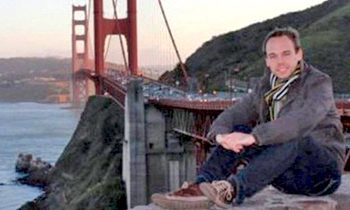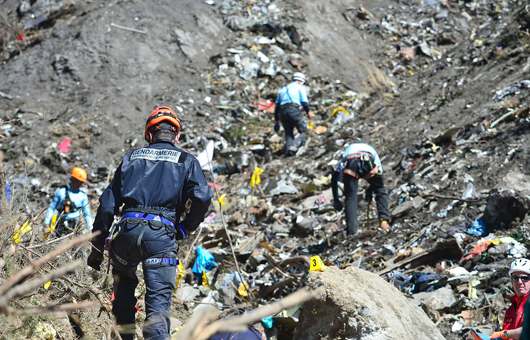Montabaur, March 27: Andreas Lubitz never appeared anything but thrilled to have landed a pilot's job with Germanwings, according to those who helped him learn to fly as a teenager in this town in the forested hills of western Germany.
On Thursday, French prosecutors said Lubitz, the co-pilot of Germanwings Flight 9525, “intentionally” crashed the jet into the side of a mountain Tuesday in the French Alps.
 Members of his hometown flight club in Montabaur, where he renewed his glider license last fall, told The Associated Press that the 27-year-old Lubitz appeared to be happy with the job he had at the airline, a low-cost carrier in the Lufthansa Group.
Members of his hometown flight club in Montabaur, where he renewed his glider license last fall, told The Associated Press that the 27-year-old Lubitz appeared to be happy with the job he had at the airline, a low-cost carrier in the Lufthansa Group.
After starting as a co-pilot with Germanwings in September 2013, Lubitz was upbeat when he returned to the LSC Westerwald e.V glider club to update his glider pilots' license with about 20 takeoffs.
“He was happy he had the job with Germanwings and he was doing well,” said long-time club member Peter Ruecker, who watched Lubitz learn to fly. “He was very happy. He gave off a good feeling.”
Club chairman Klaus Radke said he rejects the Marseille prosecutors' conclusion that Lubitz deliberately put the Germanwings flight into a descent and crashed it straight into the French Alps after the pilot had briefly left the cockpit.
“I don't see how anyone can draw such conclusions before the investigation is completed,” he told the AP.
At the house of Lubitz's parents, the curtains were drawn and four police cars were parked outside. Police blocked the media from the single-family, two-storey home in a prosperous new subdivision on the edge of Montabaur, a town 60 kilometres northwest of Frankfurt.
A team of investigators entered the home and, on Thursday evening, people could be seen emerging with blue bags, a big cardboard box and what looked like a large computer. Another person who came out was shielded from reporters with a coat by police.
Investigators also searched the apartment that Lubitz kept in Duesseldorf in an upscale three-storey building in an affluent neighbourhood.
In Montabaur, neighbour Johannes Rossmann said Lubitz appeared to be in good health and was a regular jogger. He described the pilot as calm and low-key.
“I do not believe he killed himself and claimed other people's lives,” the 22-year-old Rossmann said. “I can't believe it until it is 100 per cent confirmed.”
Lubitz learned to fly at the glider club in a sleek white ASK-21 two-seat glider, which sits in a small hangar today on the side of the facility's grass runway.
On Thursday, a large hawk circled lazily over the runway, capturing the same gentle updrafts that glider pilots use.
After obtaining his glider pilot's license as a teenager, he was accepted as a Lufthansa trainee after finishing the tough German preparatory school at the town's Mons-Tabor High School.
According to Lufthansa Chief Executive Carsten Spohr, Lubitz trained in Bremen, Germany and in Phoenix, Arizona, starting in 2008. He said there was a “several-month” gap in his training six years ago but he couldn't say what the reason was for that.
After the break, Lubitz “not only passed all medical tests but also his flight training, all flying tests and checks,” Spohr told reporters, saying the co-pilot was “100 per cent fit to fly, without any limitations.”
After completing his training, Lubitz spent an 11-month waiting period working as a flight attendant before becoming a co-pilot on the Germanwings A320 fleet. Spohr said such a waiting period is not unusual at Lufthansa.
Lubitz had logged 630 hours' flight time by the day of the crash, the airline said.
Ruecker said Lubitz had a girlfriend and gave no indication during his fall visit that anything was wrong.
“He seemed very enthusiastic” about his career, he said. “I can't remember anything where something wasn't right.”
Lubitz's family could not immediately be reached, but a Facebook page bearing Lubitz's name showed him as a smiling in a dark brown jacket posing in front of the Golden Gate Bridge in San Francisco. Ruecker confirmed that the photo was of Lubitz.
The page, which was wiped from Facebook sometime in the past two days and restored on Thursday as an “In Memory” site, said Lubitz was from Montabaur. It also lists him as having several aviation-themed interests, including the A320, the model of plane that crashed Tuesday; Lufthansa, the German aviation company; and Phoenix Goodyear Airport, in Arizona.
German Interior Minister Thomas de Maiziere said German authorities had checked intelligence and police databases on the day of the crash and Lufthansa told them that regular security checks also turned up nothing untoward about the copilot.
“According to our knowledge at this point, and after comparing the information we have, there is no terrorist background for him as a person,” de Maiziere said.






Comments
Add new comment